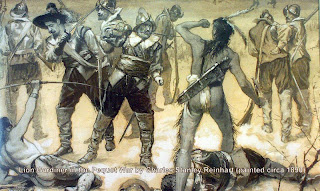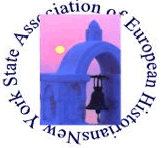 Although this is a blog of New York History, occasionally we’ll make announcements about regional events that New York historians might have interest in.
Although this is a blog of New York History, occasionally we’ll make announcements about regional events that New York historians might have interest in.
The New Jersey Forum: New Research in New Jersey Studies will be held Saturday, November 22, 2008 at the Trenton Marriott Hotel. The event is sponsored by the New Jersey Historical Commission, the NJ State Archives, and the New Jersey State Museum
Registration information and a preliminary program of events is available via word document here.
Expected sessions include:
Hope, Fear and Pestilence: Public Health in Eighteenth and Nineteenth-Century New Jersey
Newsprint, Fear, and the Cholera: A History of the 1832 Cholera Outbreaks in New Jersey (Margaret Charleroy, University of Minnesota )
The 1918 Influenza Outbreak in New Jersey (Jennifer Harmsen, Hillsborough Middle School + Rutgers-NJIT History Department)
Pestilence Across the Delaware: New Jersey and the Yellow Fever Epidemics of the 1790s (Sandra Moss, New Jersey Medical History Society)
Interpreting a Preserved Landscape: New Jersey Museums and Architecture
New Solutions for House Museums (Donna Ann Harris, Heritage Consulting, Inc.)
Take Any Exit: The Colonial Revival in New Jersey (Harriette Hawkins, independent scholar)
Telling the Straight Story: Truth & Fiction in Building Interpretation (Margaret Westfield, Westfield Architects)
Suburban Stories: Place and Race in Twentieth-Century New Jersey
Extremely Suburban: Narratives from 20th-Century Princeton (Michael H. Ebner, James D. Vail III Professor of History, Emeritus, Lake Forest College)
African American Suburbanization and Racial Politics in Pre-World War II Montclair
(Patricia Hampson, Rutgers University)
A National “Black Brain Center” in Post-WWII Fort Monmouth, NJ (Melissa Ziobro, staff historian, U.S. Army CECOM Life Cycle Management Command, Fort Monmouth, NJ)
Parks and Bonapartes: Landscapes of 19th and 20th century New Jersey
“He Will be a Bourgeois American and Spend his Fortune in Making Gardens”: A Preliminary Examination of Joseph Bonaparte’s Point Breeze Estate, Bordentown, New Jersey (Richard Veit, Department of History and Anthropology, Monmouth University)
The Development of Branch Brook Park – America’s First County Park (Kathleen Galop, Preservation Possibilities)
Morristown: A Cultural Landscape Study (Gillian Acheson, Department of Geography, Southern Illinois University at Edwardsville)
Revolutionary Women: Female Education and Political Activism in Early New Jersey
“A More Accurate and Extensive Education than is Customary”: Educational Opportunities for Women in Early Nineteenth-Century New Jersey (Lucia McMahon, William Paterson University)
The Ladies of Trenton: Women’s Political and Public Activism in Revolutionary New Jersey (Catherine Hudak, Morris Hills High School, Rockaway, NJ)
“Working for the Slave as a Mother would Work for her Children”: Abigail Goodwin and the Anti-slavery Movement in New Jersey (Bruce Scherer, Project Archivist/Librarian, Salem County Historical Society, Salem, NJ)
Eighteenth-Century New Jersey Families
From London Publisher to American Farmer: Benjamin Clarke and his Diary of East New Jersey (Robert Craig, Historic Preservation Office, NJ Department of Environmental Protection)
Black and White Together? Slavery and Freedom in Upper Freehold Township from the Colonial Period to the Early Republic (Sue Kozel, Independent scholar)
Vital History: What Two Generations of a Loyalist Family Reveals About the American Revolution (Donald Sherblom, President, 1759 Vought House, Inc.)
 The organizers invite submissions of papers for an international conference, “Cities in Revolt: The Dutch-American Atlantic, ca. 1650-1830″- to be held November 13-14, 2009, at Columbia University. Ranging from the conquest of New Amsterdam to the presidency of Martin van Buren, the conference aims to document the continuous and fruitful political exchanges that took place in the long eighteenth century between the Dutch Republic and empire on the one hand and British North America and the United States on the other.
The organizers invite submissions of papers for an international conference, “Cities in Revolt: The Dutch-American Atlantic, ca. 1650-1830″- to be held November 13-14, 2009, at Columbia University. Ranging from the conquest of New Amsterdam to the presidency of Martin van Buren, the conference aims to document the continuous and fruitful political exchanges that took place in the long eighteenth century between the Dutch Republic and empire on the one hand and British North America and the United States on the other. 




